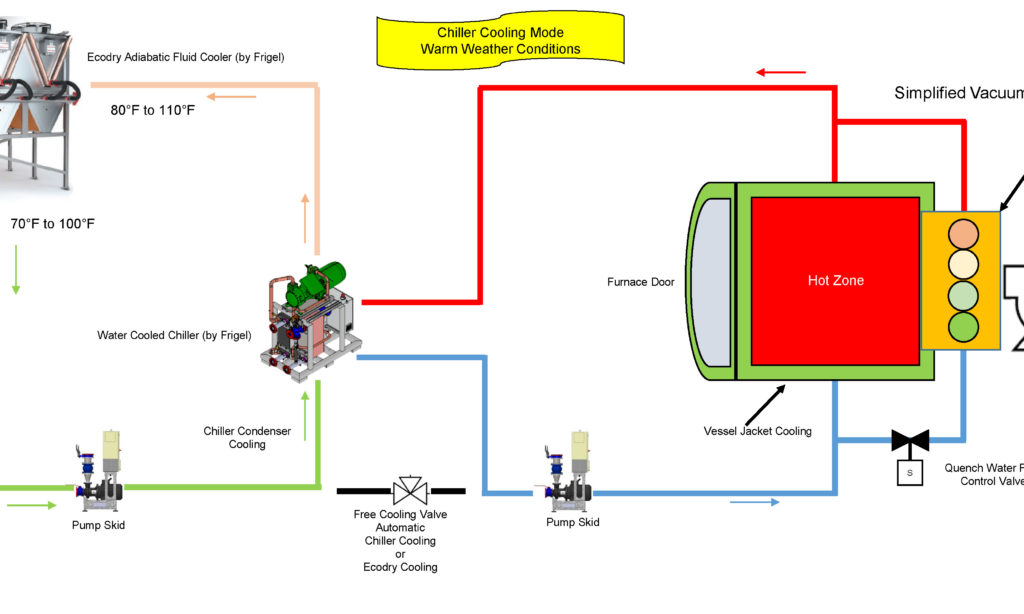Intelligent Cooling System (ICS) is a next-generation cooling solution that incorporates advanced technologies like AI (Artificial Intelligence), IoT (Internet of Things), sensor integration, and real-time analytics to provide adaptive and efficient thermal management.
Unlike traditional systems that operate on preset schedules or manual controls, ICS works autonomously, learning from system behavior, environmental inputs, and heat loads. It then predictively adjusts its cooling response to ensure optimal performance with minimal energy consumption.
This makes intelligent cooling a critical infrastructure in today’s world—powering data centers, electric vehicles, green buildings, manufacturing lines, and even indoor farming operations. As climate change and energy costs intensify, intelligent cooling emerges as a sustainable, scalable, and smart solution.
Core Technologies Behind Intelligent Cooling Systems
Smart Sensor Integration
An intelligent cooling system is filled with sensors that constantly monitor:
- Temperature (air, fluid, surface)
- Humidity
- Pressure
- Coolant flow rate
- Power consumption
- Ambient conditions (outdoor temp, sunlight, occupancy)
These sensors are networked and relay data to a central control system, which uses it to determine the exact cooling needs at any moment. For example:
- If the room is unoccupied, the cooling load can be reduced.
- If humidity is rising and airflow is low, the system can activate specific fans or vents.
AI and Machine Learning
Artificial intelligence enables the system to learn from operational data and optimize itself over time.
AI algorithms can:
- Analyze trends in thermal behavior
- Predict heat spikes before they happen (e.g., before peak working hours or server load)
- Customize cooling strategies based on specific zones or equipment
- Balance cooling performance with energy consumption
For instance, in a data center, AI may recognize that Server Rack A always overheats during midday operations and adjusts airflow patterns in advance to prevent a spike.
IoT (Internet of Things) Connectivity
IoT-enabled systems allow intelligent cooling to connect to:
- Remote control platforms
- Mobile dashboards
- Other building systems (lighting, security, HVAC, etc.)
This provides:
- Real-time visibility into performance
- Centralized control across multiple sites
- Cloud-based alerts and diagnostics
An operator could monitor a cooling system from a smartphone while being on a different continent—and even trigger maintenance remotely if anomalies are detected.
Adaptive Control Algorithms
These control systems adjust cooling output in real time, based on feedback from sensors and AI.
They enable:
- Zone-based cooling: Prioritize areas of higher thermal demand
- Multi-mode switching: Change from passive to active cooling when needed
- Load balancing: Spread thermal stress evenly across all systems
In manufacturing, this ensures that only machines in operation receive cooling, while idle units are bypassed—saving energy without sacrificing performance.
Industry Applications of Intelligent Cooling Systems
Data Centers & Server Rooms
- Intelligent cooling systems manage massive heat loads from servers.
- Use zonal airflow control and liquid cooling AI algorithms to eliminate hotspots.
- Result: 30–40% reduction in cooling energy use, increased uptime, and hardware longevity.
Electric Vehicles (EVs)
- Batteries generate heat during charging and discharging.
- Intelligent cooling:
- Balances battery pack temperatures
- Adjusts cooling based on driving patterns and outside temperature
- Enhances battery efficiency, performance, and lifespan
Smart Commercial Buildings
- ICS in buildings works with HVAC to:
- Respond to occupancy
- Adjust airflow per zone or floor
- Coordinate with natural ventilation and lighting
This results in optimized comfort, lower energy bills, and supports green building certifications like LEED or IGBC.
Environmental & Energy Benefits
An intelligent cooling system not only protects equipment—it also:
- Reduces CO₂ emissions by minimizing energy usage
- Supports demand response by scaling down during peak grid hours
- Enables integration with solar or wind energy
- Encourages smart water usage in cooling towers or mist systems
Net Result: Lower operational costs, smaller carbon footprint, and alignment with ESG goals.
Integration with Other Smart Systems
ICS can seamlessly integrate with:
- Smart grids (to respond to dynamic electricity pricing)
- Building automation systems
- Digital twins (simulate building heat patterns before applying changes)
- Blockchain-based energy platforms (for shared buildings or facilities)
These integrations enhance not only performance but also interoperability and sustainability.
Future Trends in Intelligent Cooling Systems
- AI-as-a-Service for Cooling
Cloud-based platforms that offer AI optimization models that plug into your cooling system. - Self-Healing Cooling Networks
Redundant intelligent paths that reconfigure themselves if a cooling route fails. - Biometric & User-Centric Cooling
In smart buildings, facial recognition or smartphone detection adjusts personal cooling. - Edge-based Cooling Control
Real-time decision-making at the site without needing constant cloud input.
Intelligent Cooling System is no longer a futuristic luxury—it is a modern necessity. Whether you’re managing a data center, running a factory, building a smart home, or growing vertical crops, ICS ensures that heat never becomes a hidden threat.
By blending AI, sensors, automation, and connectivity, intelligent cooling empowers systems to be resilient, efficient, and responsive—paving the way toward net-zero energy goals, smarter infrastructure, and a sustainable future.

